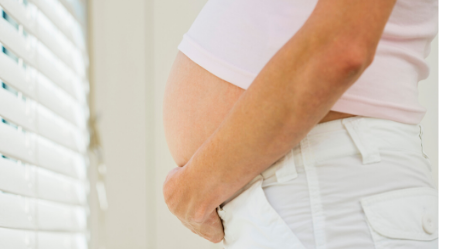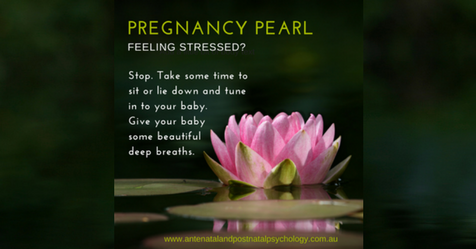|
Pregnancy is a time of great uncertainty - a time when horror stories are rife and fears about harm befalling one’s baby, common. Anxiety can be particularly significant for women who have experienced pregnancy losses (or vicarious losses through family or friends); been through the ‘roller coaster’ of fertility treatment; received diagnoses of fetal anomalies; or who have experienced a previous traumatic birth. In addition, an anxious temperament can pre-dispose women to heightened anxiety in pregnancy, especially in the face of stressful life events. Although anxiety tends to be seen as the 'normal' emotional landscape for pregnant women, elevated levels of anxiety can be debilitating, and can contribute to emotional disturbance in the postnatal period. Symptoms of antenatal anxiety might be overlooked by common symptoms of pregnancy such as increases in heart rate, shallow breathing, and sleep disturbance (Wenzel, 2011). In order to identify whether symptoms are problematic, the questions for women to ask themselves and/or their health practitioners are 1. "Are my symptoms interfering with my life (e.g., avoidance of usual activities for fear of feeling anxious, relationship problems, sleep disturbance, constant reassurance seeking)?" and 2. "Are my symptoms causing me distress (e.g. upsetting or intrusive thoughts and/or distressing symptoms in the body)?" (Wenzel, 2011) Women do not need to experience high levels of anxiety and worry in pregnancy or the postpartum. Cognitive-Behavioural Therapy (CBT) can help women to learn how to manage both the physiological (body) symptoms, and the mental worry, which can contribute to a calmer pregnancy, birth, and adjustment to new parenthood. Written by Dr Renée Miller Principal Perinatal Clinical Psychologist Founder Antenatal & Postnatal Psychology Network Co-founder The Perinatal Loss Centre References Wenzel, A. (2011). Anxiety in childbearing women. Washington: American Psychological Association. Wenzel, A. & Kleiman, K. (2015). Cognitive Behavioral Therapy for perinatal distress. New York: Taylor & Francis. Take stock of the pace in which you are operating. Does it seem like there are endless tasks on your 'to do' list? You don't have time to sit down? You are constantly rushing? Do you feel stressed by the deadline of your baby’s due date?
We can fall into the trap of just keeping on going – trying to get everything done before bubs comes along. Stop...slow down. Add "time-out" to your 'to do' list. No one can just keep going. Allow your 'to do' list to roll over each day. Slow down the pace in which you are moving. Listen to what your body needs, take breaks, and spend time tuning in to your baby. It's important to restore our systems. Ironically, this allows us to get more done. Look realistically at what could be done after the baby is born. Does it all have to be done now? If you are feeling out of control, your sleep is disturbed from stress, or you feel that your stress levels are just too high, seek help.
"What if I can't have children?"
"What if I fall pregnant, but something goes wrong?" "What if I've eaten something that will harm my baby?" "What if the fumes from that building site are toxic to my baby?" "What if I have a stillbirth?" "What if my baby gets sick because of something I did wrong?" "What if my baby is getting into bad sleep habits?" "What if my baby has a developmental delay?" "What if I am a bad mother?" According to a Harvard Health Publication, women experiencing infertility felt as anxious as patients diagnosed with cancer. Anxiety is reported to be higher in pregnancy than in the postpartum (Andersson, et al., 2006), with anxiety symptoms found in more than 25% of pregnant women (Ross & McLean, 2006). Significant anxiety during pregnancy puts women at risk for poor postnatal adjustment (Wenzel, 2011). And, anxiety in the postpartum can adversely affect the couple relationship, and the mother-infant relationship. With or without full blown panic attacks, anxious women commonly report the following symptoms:
GAD and other anxiety disorders (Adjustment Disorder with Anxious Mood, Obsessive-Compulsive Disorder, Panic Disorder, Post-Traumatic Stress Disorder, Social Anxiety Disorder) can be diagnosed and treated by psychologists or psychiatrists who specialise in pregnancy and the postpartum. With the use of medication and/or talking therapies (e.g., Cognitive-Behavioural Therapy), women can learn to manage "what if" thinking, and the associated physiological arousal, cultivating an optimal emotional environment for falling pregnant and enjoying their pregnancies and babies. Written by Dr Renée Miller (perinatal clinical psychologist) References Andersson, L., Sundstrom-Poromaa, I., Wulff, M., & Astrom, M. (2006). Depression and anxiety during pregnancy and six months postpartum: A follow-up study. Acta Obstetricia et Gynaecological Scandinavia, 8, 937-944. Ross, L.E., & McLean, L.M. (2006). Anxiety disorders during pregnancy and the postpartum period: A systematic review. The Journal of Clinical Psychiatry, 67, 1285-1298. Wenzel, A. (2011). Anxiety in childbearing women. Washington: American Psychological Association. http://www.health.harvard.edu/newsletter_article/The-psychological-impact-of-infertility-and-its-treatment
Although anxiety tends to be seen as the 'normal' emotional landscape for pregnant women, elevated levels of anxiety can be debilitating, and can contribute to emotional disturbance in the postnatal period. Symptoms of antenatal anxiety might be overlooked by common symptoms of pregnancy such as increases in heart rate, shallow breathing, and sleep disturbance (Wenzel, 2011).
In order to identify whether symptoms are problematic, the questions for women to ask themselves and/or their health practitioners are 1. "Are my symptoms interfering with my life (e.g., avoidance of usual activities for fear of feeling anxious, relationship problems, sleep disturbance, constant reassurance seeking)?" and 2. "Are my symptoms causing me distress (e.g. upsetting or intrusive thoughts and/or distressing symptoms in the body)?" (Wenzel, 2011) Women do not need to experience high levels of anxiety and worry in pregnancy or the postpartum. Cognitive-Behavioural Therapy (CBT) can help women to learn how to manage both the physiological (body) symptoms, and the mental worry, which can contribute to a calmer pregnancy, birth, and adjustment to new parenthood. References Wenzel, A. (2011). Anxiety in childbearing women. Washington: American Psychological Association. Wenzel, A. & Kleiman, K. (2015). Cognitive Behavioral Therapy for perinatal distress. New York: Taylor & Francis.
Although anxiety tends to be seen as the 'normal' emotional landscape for pregnant women, elevated levels of anxiety can be debilitating, and can contribute to emotional disturbance in the postnatal period. Symptoms of antenatal anxiety might be overlooked by common symptoms of pregnancy such as increases in heart rate, shallow breathing, and sleep disturbance (Wenzel, 2011).
In order to identify whether symptoms are problematic, the questions for women to ask themselves and/or their health practitioners are 1. "Are my symptoms interfering with my life (e.g., avoidance of usual activities for fear of feeling anxious, relationship problems, sleep disturbance, constant reassurance seeking)?" and 2. "Are my symptoms causing me distress (e.g. upsetting or intrusive thoughts and/or distressing symptoms in the body)?" (Wenzel, 2011) Women do not need to experience high levels of anxiety and worry in pregnancy or the postpartum. Cognitive-Behavioural Therapy (CBT) can help women to learn how to manage both the physiological (body) symptoms, and the mental worry, which can contribute to a calmer pregnancy, birth, and adjustment to new parenthood. References Wenzel, A. (2011). Anxiety in childbearing women. Washington: American Psychological Association. Wenzel, A. & Kleiman, K. (2015). Cognitive Behavioral Therapy for perinatal distress. New York: Taylor & Francis. |
AuthorPosted by Dr Renée Miller Topics
All
|
|
We acknowledge and pay respects to the Elders and Traditional Owners of the land on which our psychologists practise.








 RSS Feed
RSS Feed

